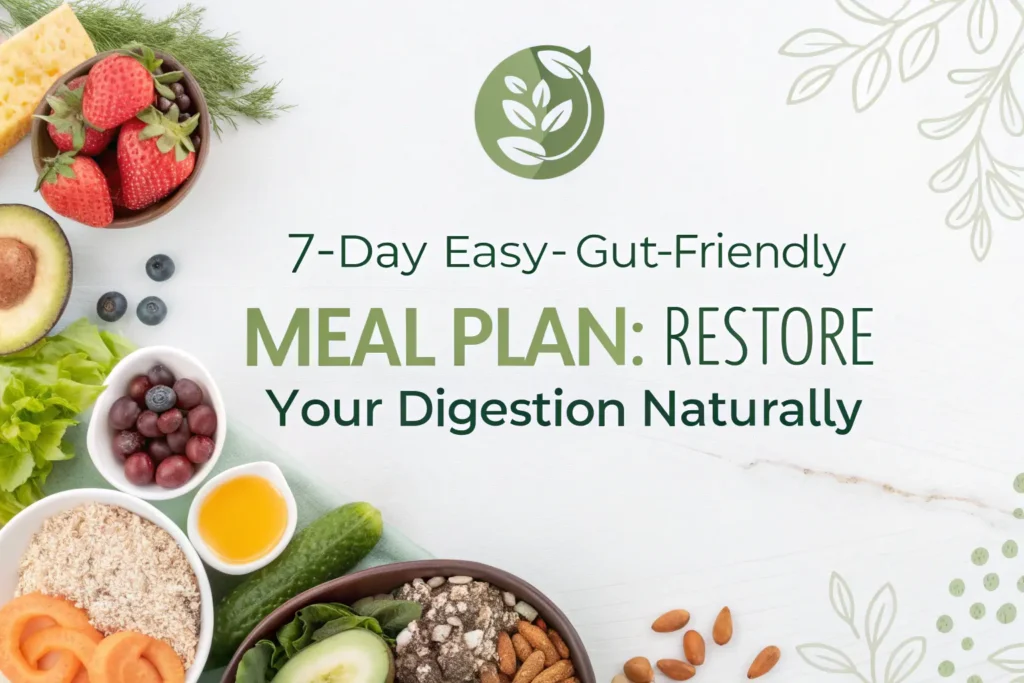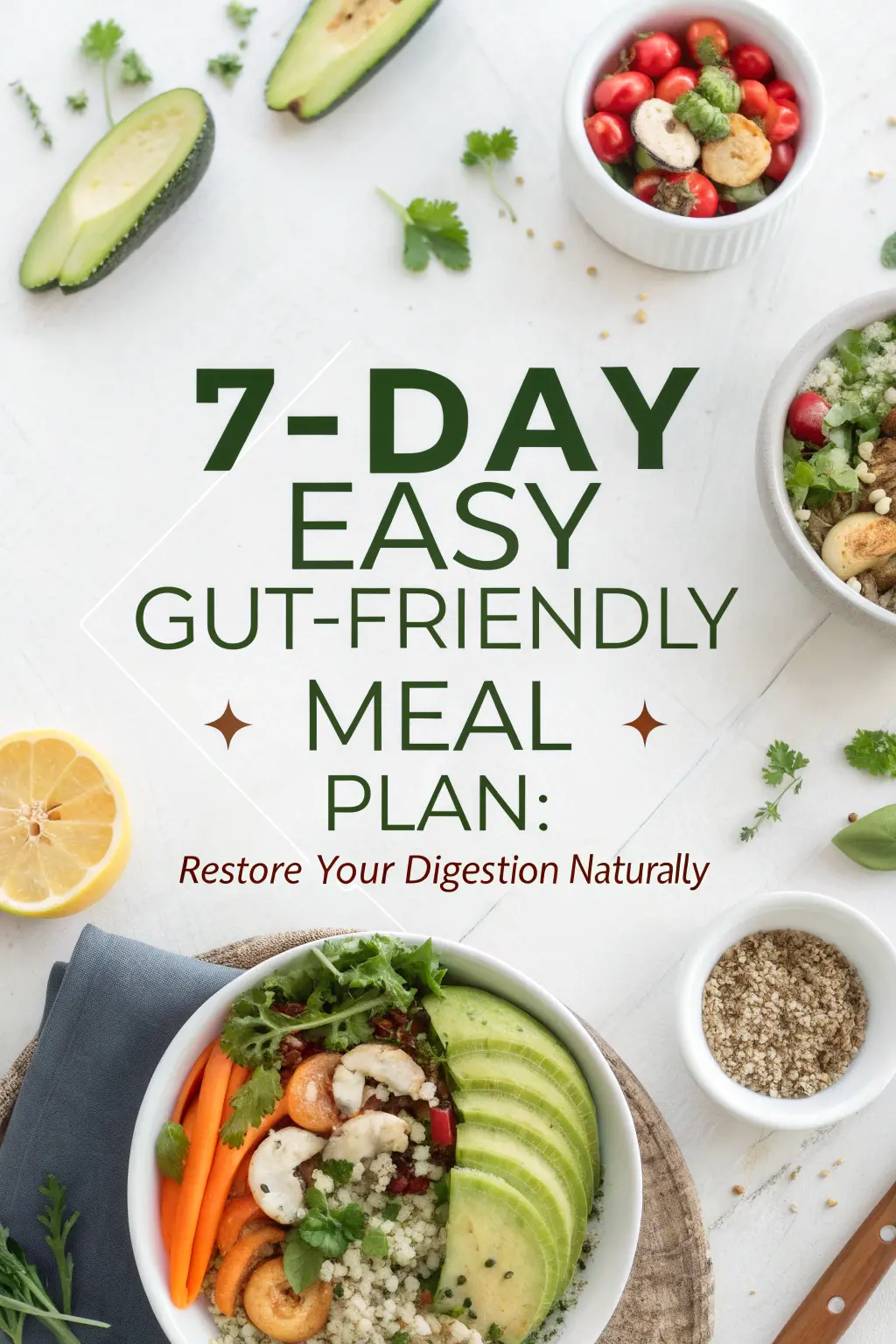Struggling with bloating, irregular digestion, or simply feeling like your gut isn’t working at its best? Think you need complicated diets or expensive supplements? This 7-day gut-friendly meal plan challenges that assumption. It’s about making simple swaps and focusing on food quality to support your digestive health naturally. Forget restrictive rules, let’s nourish your gut!
Table of Contents
Why a Gut-Friendly Meal Plan Matters
Your gut microbiome, the trillions of bacteria living in your digestive tract, plays a crucial role far beyond just digestion. It impacts your immune system, brain health, and even your mood. A balanced gut microbiome is linked to better immunity, clearer skin, sustained energy levels, and overall well-being. By following a gut-friendly meal plan, you’re essentially giving your internal ecosystem the care it deserves.

Ingredients List for the Week
This plan focuses on whole, nourishing foods. Here are the core ingredients you’ll likely need:
- Whole Grains: Oats, brown rice, quinoa, whole-wheat bread/pasta.
- Fiber-Rich Vegetables: Broccoli, spinach, kale, carrots, sweet potatoes, Brussels sprouts, onions, garlic.
- Fruits: Apples, pears, berries, oranges, bananas, figs.
- Lean Protein Sources: Skinless chicken breast, turkey, fish (salmon, trout), beans, lentils, tofu, eggs.
- Fermented Foods: Yogurt (live cultures), kefir, sauerkraut, kimchi, miso (use sparingly).
- Healthy Fats: Avocado, nuts (almonds, walnuts), seeds (chia, flax, pumpkin), olive oil.
- Herbs & Spices: Turmeric, ginger, cinnamon, basil, parsley, oregano, cumin (use sparingly).
- Hydration: Water, herbal teas (peppermint, ginger, chamomile).
Substitutions: Always check ingredient labels for added sugars or artificial ingredients. For example, choose plain yogurt over flavored varieties, and whole-wheat flour over refined white flour whenever possible.
Timing for Your Gut-Friendly Meals
Consistency is key, but flexibility is also important. Aim for three main meals and one satisfying snack between meals. Preparation time varies, but many meals can be partially prepped ahead.
Preparation Time: Approximately 15-20 minutes per main meal prep session, plus chopping vegetables.
Cooking Time: 20-30 minutes per main meal, depending on complexity.
Total Daily Time Investment: Around 45-60 minutes daily, including meal prep and cooking. This is roughly 20-30% less time than a complex multi-course dinner plan, freeing up more time for you!
Day 1: Kickstarting Gut Health
Breakfast: Rolled oats oatmeal topped with sliced banana, chia seeds, and a dash of cinnamon.
Lunch: Large salad with mixed greens, grilled chicken strips, chickpeas, shredded carrots, cucumber, bell peppers, drizzled with olive oil and lemon juice. Add a side of plain yogurt.
Dinner: Baked salmon fillet seasoned with dill, lemon juice, and garlic. Serve with steamed broccoli and quinoa.
Snack: An apple paired with a small handful of almonds.
Day 2: Fiber Focus
Breakfast: Scrambled eggs with spinach and feta cheese. Serve with a slice of whole-wheat toast.
Lunch: Lentil soup ( homemade or store-bought broth-based) with a side of mixed green salad featuring orange segments.
Dinner: Turkey meatballs (lean ground turkey) in marinara sauce (check for sugar content) served over whole-wheat spaghetti. Side of roasted Brussels sprouts.
Snack: A small pear.
Day 3: Fermented Foods & Variety
Breakfast: Smoothie made with unsweetened almond milk, a scoop of protein powder (optional, ensure it’s gut-friendly), a handful of spinach, frozen berries, and a tablespoon of flax seeds.
Lunch: Leftover turkey meatballs and whole-wheat spaghetti.
Dinner: Baked sweet potato cubes seasoned with ginger and garlic. Serve with a stir-fry using tofu, broccoli florets, carrots, and snap peas in a ginger-soy sauce (low sugar). Served over brown rice.
Snack: Plain Greek yogurt with a drizzle of honey and a handful of walnuts.
Nutritional Information Breakdown
This gut-friendly meal plan is designed to provide balanced nutrition:
Macronutrients: Focuses on complex carbohydrates (whole grains, vegetables, fruits) for sustained energy, lean proteins for muscle repair and satiety, and healthy fats (avocado, nuts, seeds, olive oil) for hormone production and nutrient absorption.
Fiber: Crucial for healthy digestion and feeding beneficial gut bacteria. Expect meals rich in soluble and insoluble fiber from oats, beans, lentils, vegetables, fruits, and whole grains.
Probiotics: Fermented foods like yogurt and potentially kefir introduce beneficial bacteria directly.
Antioxidants: Abundant in colorful fruits and vegetables, protecting your cells from damage.
Calories: Aim for approximately 1500-1800 calories daily, easily adjustable by portion sizes. This plan is naturally nutrient-dense without being overly calorie-heavy.
Healthier Alternatives for the Recipe
Customize this plan to your needs:
- **Gluten-Free:** Substitute grains with certified gluten-free oats, rice, quinoa, or certified gluten-free bread/pasta.
- **Vegetarian/Vegan:** Replace animal protein with legumes (beans, lentils), tofu, tempeh, or plant-based protein sources.
- **Lower-Sodium:** Opt for low-sodium versions of canned beans and broth, season with herbs and spices instead of excessive salt.
- **Low-FODMAP:** Consult a low-FODMAP diet guide to select appropriate low-FODMAP fruits and vegetables. Focus on green beans, carrots, zucchini, bell peppers, strawberries, oranges, etc.
- **Dairy-Free:** Use almond milk instead of cow’s milk, and choose non-dairy yogurts.
Serving Suggestions to Enhance Flavor & Benefits
Make your meals even more appealing:
- Add fresh herbs (basil, cilantro, parsley) to dishes for extra flavor and nutrients.
- Toss vegetables with olive oil, salt, and pepper, then roast to bring out their natural sweetness and improve texture.
- Try different herbs and spices like turmeric (anti-inflammatory), ginger (soothing), and cinnamon (blood sugar supportive).
- Add healthy fats such as avocado slices to your salads or sandwiches.
- If you enjoy soups, add nutrient-dense ingredients like bone broth (rich in amino acids) or miso paste (probiotic, use sparingly).
- Stay hydrated throughout the day, especially before meals.

Common Mistakes to Avoid When Starting
Embarking on a gut-friendly journey requires awareness:
- Sudden Diet Change: Gradually introduce new foods to avoid digestive upset. Don’t eliminate entire food groups too quickly.
- Relying too much on supplements: Focus on obtaining nutrients primarily from whole foods. Supplements are meant to support—not substitute—a balanced diet.
- Ignoring Personal Triggers: Pay attention to how different foods make *you* feel. Keep a food diary to identify potential triggers for bloating or discomfort.
- Not Chewing Thoroughly: Proper chewing aids digestion significantly. Aim to chew each bite 15-20 times.
- Insufficient Water Intake: Dehydration can impair digestion. Aim for 8-10 glasses of water daily.
Storing Tips for Convenience
Make meal prep easier:
- **Wash and chop** vegetables for the week ahead.
- Prepare grains such as quinoa or brown rice in bulk and refrigerate for later use.
- **Portion out** lean proteins like chicken or fish.
- **Chop fruits** for snacks.
- Keep leftovers stored quickly in airtight containers in the fridge for up to 3-4 days.
- **Keep** plain yogurt or hummus in the fridge for quick snacks.
Conclusion: Your Journey to Better Gut Health
This 7-day gut-friendly meal plan offers a practical, delicious way to support your digestive system naturally. By focusing on fiber-rich foods, lean proteins, healthy fats, and incorporating fermented options, you’re providing your gut with the nourishment it needs to flourish. Remember, consistency is key. This isn’t about perfection, but progress. Listen to your body, experiment with flavors, and enjoy the journey towards a happier, healthier gut!
Ready to implement this plan? Grab your ingredients and start cooking! Let us know in the comments below how your gut-friendly journey goes. For more tips on maintaining digestive wellness, explore our category on Gut-friendly meal plan.
For those interested in extending this foundational approach, consider exploring resources like Gut-friendly meal plans for a longer-term commitment.





